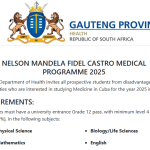With fully subsidized education, Canada provides some of the world’s greatest colleges, vibrant cosmopolitan cities, and magnificent scenery.
This article covers both how to get employment through the Federal Student Work Experience Program (FSWEP), which is intended to give Canadian students paid work opportunities while they study, and how to fulfill your academic aspirations in Canada through scholarships.
Table of Contents
What is the Federal Student Work Experience Program (FSWEP)?
The Federal Student Work Experience Program (FSWEP) is Canada’s largest student employment program, providing thousands of jobs across a range of government agencies. With flexible part-time and full-time job possibilities in sectors ranging from administration and finance to IT and environmental sciences, it’s meant to give students the option to obtain work experience while studying.
For foreign students studying in Canada, this program is a fantastic way to obtain useful work experience, supplement their income, and possibly pave the way for a full-time position in the Canadian government.
Eligibility Criteria for the Federal Student Work Experience Program (FSWEP)
#1. Student Status:
You have to be enrolled full-time in a recognized educational program. Students with disabilities are accepted as long as their school considers them full-time.
#2. Age Requirement:
In order to work in your province or territory, you must be at least the minimum age.
#3. Returning to Study:
Unless you are in your final year and have previously taken part in FSWEP or comparable programs, you should schedule a full-time return to studies following your work period.
How to Apply for the Federal Student Work Experience Program (FSWEP)?
The following is a step-by-step process that will help you align your academic journey with your strategic targeting of FSWEP to land a job in Canada:
#1. First, get a scholarship.
Finding a scholarship to pay for your study in Canada should be your first move. This will free you up to concentrate on your education and future professional goals. There are numerous scholarships available to international students that can drastically lower your living and tuition expenses.
For overseas students, Canada provides a wide range of scholarships that cover living expenses, tuition, and even travel fees. Regardless of whether a scholarship is fully or partially supported, it greatly increases access to education in Canada.
Read Also: Scholarships in Canada without IELTS For International Students in 2024
#2. Enroll now to begin earning your degree.
After receiving a scholarship, register for the program of your choice to start your academic career in Canada. Focus on developing a solid academic record and acquiring industry-relevant skills throughout this period. You’ll need this in the future when you apply for FSWEP positions.
#3. Complete 80% of Your Education
By the time you reach the end of your studies—ideally, 80% of the way through—you’ll be well-positioned to consider using FSWEP to obtain real-world work experience. By now, you should have acquired sufficient academic knowledge and applicable skills to compete for positions in the public sector of Canada.
#4. Add Your Profile to the FSWEP Pool
Once you’ve completed 80% of your education, you can add your profile to the FSWEP program pool here: https://www.canada.ca/en/public-service-commission/jobs/services/recruitment/students/federal-student-work-program.html.
Benefits of the Federal Student Work Experience Program (FSWEP)
#1. Paid Work Experience:
Get real-world experience while making money to finance your education.
#2. Career Development:
FSWEP can assist you in gaining traction in one of the several career pathways that the Canadian government offers.
#3. Networking:
Create relationships with industry experts and fellow students to lead to future employment prospects.
#4. Flexible employment Options:
Full-time and part-time jobs let you manage your employment and academic obligations.
How Much Does It Cost to Study in Canada?
Below is a breakdown of 2024’s average tuition prices:
- Bachelor’s Degree: $20,000 to $60,000 CAD per year
- Master’s Degree: $18,000 to $50,000 CAD per year
- PhD: $7,000 to $25,000 CAD per year
Furthermore, a study visa, accommodation, food, travel, and personal expenses are additional costs that can total between $10,000 and $15,000 CAD each year (Ref).
Benefits of working in Canada
There is no doubt that Canada, a country in North America, is indeed a great place to work and study. This is especially because the country offers high-quality education and degrees that are recognized globally. Some of the benefits you stand to enjoy when you decide to relocate to Canada include:
1. Economic Opportunities
One of the benefits of working in Canada is the stable state of the country’s economy. In 2022, the country’s annual gross domestic product was summed at $2.14 trillion in current USD, according to the World Bank Data. This figure catapulted the country to become the ninth-largest economy. Additionally, the largest industries in the country (measured by their contributions to the GDP) are real estate, rental and leasing, manufacturing; mining, quarrying, and oil and gas extraction. Additionally, Canada is also on the list of countries with the highest minimum wage in the world, with the amount ranging from C$10.85 to C$14 per hour. The country is also home to the popular e-commerce company Shopify.Inc., major banks like the Royal Bank of Canada, Enbridge, Thomson Reuters, CGI Inc., and Blackberry, among others.
2. Educational Advancements
Not only is the Canadian economy robust and stable, but the educational sector in the country is also one to commend. The country houses top universities like the University of Toronto, which ranks 21 globally, McGill University, which ranks 30 globally, the University of British Columbia, which ranks 34 globally, the University of Alberta, and the University of Waterloo, among others, If you’re thinking of pursuing a master’s program in Canada, the educational system is more than capable of attending to your academic related needs.
3. Job Security in Canada
Another benefit you stand to enjoy as a worker in Canada is job security. Workers in Canada have access to Employment Insurance and this guarantees that there are certain financial benefits they are eligible to access when they lose their jobs. Furthermore, workers can get as much as 35% of their average weekly earnings when they lose their jobs and qualify for employment insurance.
Read also: How To Finance Your Study Abroad Experience
4. Access to a Healthcare Program
Furthermore, the Canada Universal Healthcare System ensures that healthcare benefits are given to individuals. Citizens have access to receive medical services for free because of the program. Also, both permanent residents and people with valid work visas can access medical services that cover drug prescriptions for free in the country. In addition to the free healthcare plan offered by the government, companies also ensure the well-being of their staff healthwise by offering subsidized medical treatments for citizens, irrespective of the type of job they do.
Read Also: How to get loans to study in the USA and Canada









